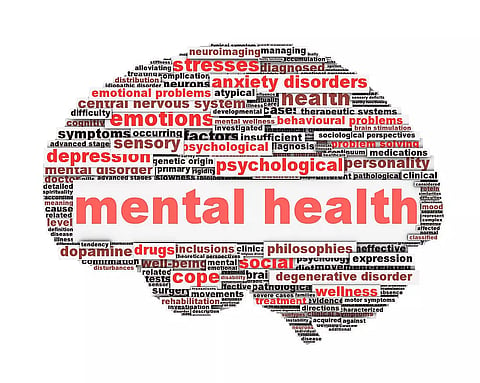
- Home
- Live Blog
- Breaking News
- Top Headlines
- Cities
- NE News
- Sentinel Media
- Sports
- Education
- Jobs

Moitrayee Das
(She can be reached at moitrayee.das@flame.edu.in)
In the past two years, the word 'mental health' has gained undeniable attention. Of course, how far we truly understand what exactly is 'mental health', is still a big question mark. According to the World Health Organization (WHO), mental health is "a state of well-being in which the individual realizes his or her abilities, can cope with the normal stresses of life, can work productively and fruitfully, and can contribute to his or her community". In 2017, three years before the pandemic, the President of India, Ram Nath Kovind said that, "India was facing a mental health epidemic". This statement encompasses the horrifying fact that there is a huge problem facing us and it needs to be urgently addressed and worked on if we want to save lives. According to the American Psychiatric Association, "Mental illnesses are health conditions involving changes in emotion, thinking or behaviour (or a combination of these). Mental illnesses are associated with distress and/or problems functioning in social, work or family activities". A study published in 2017 and a Lancet study published in 2019 showed that 14% of India's population lives with some form of mental illnesses which include 45.7 million suffering from depressive disorders and 49 million suffering from anxiety disorders, the numbers are likely to be much higher in the current times!
The importance of mental health and the consequences of poor mental health have been well documented and discussed in the academic forums among many others but how far are we managing the dire situation of the poor mental health condition in India? A country with a population of 1.41 billion of which more than 14% of the population lives with a mental illness demands a well-crafted and executed treatment plan to deal with this public health concern. According to a study published in the Journal of Conflict and Health, mental health problems account for 7.4% of disability-adjusted life years (DALY), and 22.9% of all years lived with disability (YLD). As the world is slowly opening up after the devastating consequences of the pandemic, it is imperative to understand the consequences it has had on our mental health and the way forward from here.
As children go back to their classrooms in schools and colleges leading the lives they once led, it becomes crucial for each one of us to be sensitive to their mental health needs. The training and sensitization programs for teachers, administrators, educators, parents and all the stakeholders involved with the students is critical. The unfortunate cases of suicide among the youth have also risen in the current times and clearly, the gap between the problem and solution has widened. Many factors affect one's mental health and one of the top factors is social media. The ugly road of comparison leading to envy and everything that comes in between the two is worrisome for all age groups to be honest, but more so with this delicate group. The pros and cons of social media have been debated for a long time now and everyone has something to say when it comes to this topic. But there is no doubt about the fact that unregulated use of social media only leads to mental health problems having dire consequences many times. A study published in the journal of Child and Adolescent Mental Health studied the relationship between anxiety and student absenteeism and found a strong correlation between the two. Many studies have shown that higher rates of school absenteeism lead to poor school performance. The issues of mental health disproportionately affect students from historically marginalized and oppressed groups. The economic, health and other disparities students from these communities face creating excessive stress and hardship that can lead to mental health illnesses and substance abuse. Additionally, members of these communities are less likely to have access to mental health support and resources.
We are living in challenging times and it is important that with the passing times the understanding and realization of mental health is an integral part of one's health is well understood and accepted. The treatment of problems happens when we understand what the problem is in the first place. Mental health problems are as real and as complex as it gets. It is not a phase nor is it attention-seeking behaviour that people exhibit to be at the centre of attention. Ironically, most people living with a mental illness will try their level best to hide their pain behind masked smiles and forced laughter lest people will know the turmoil they are experiencing within. The daily statistics of rising mental illnesses are horrifying, to say the least, and it is high time that we as individuals irrespective of our professions and designations understand that just like a broken arm, a troubled mind also requires due diagnosis and treatment. As a country, we have a very long way to go, but it is heartening to see that there are some positive changes in terms of mental health policies, helplines and programs being implemented by certain organizations and state governments. While there is so much focus and attention on what people achieve and what they do, if we could just shift that lens a little bit towards genuinely caring and understanding how people truly feel and if they doing okay, then maybe, just maybe, we could begin to understand the problem and deal with it effectively.